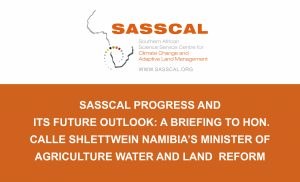
SASSCAL’s Executive Director paid a courtesy visit to the Minister of Agriculture, Water and Land Reform (MAWLR). The purpose of the visit was to acquaint the key stakeholders of the ministry on SASSCAL’s historical perspectives and achievements, current statusof projects, the institution’s future plans as well to deliberate on issues that will inform the agenda for the forthcoming 1st Extra-ordinary meeting of the SASSCAL Ministerial Council.
The courtesy call was in the form of a virtual meeting, which was held on the 21st of June 2021. Present at the meeting was Hon. Carl GH Schlettwein, Minister of Agriculture, Water and Land Reform, Hon. Anna Shiweda, Deputy Minister, Namibian Member and Alternate Board Member of SASSCAL Governing Board Mrs Sophia Kasheeta and Mr Kintinu Sageus.
Hon. Carll Schlettwein is the current Chairperson of the Council of Ministers, the highest organ of SASSCAL, which is constituted by the Ministers responsible for SASSCAL in the Member States and the German Federal Minister of Education and Research as the initial funding partner.
In her presentation to the Hon. Schlettwein, Dr Jane Olwoch highlighted the important task that SADC Member States face under the current climate change conditions, noting particularly that despite all global and regional efforts, the vulnerability to climate change continue to increase in the SADC Region. She emphasised that, a regional approach to climate change is what will offer better scientific information that aids policy decisions. Dr. Olwoch further highlighted SASSCAL’s historical background from its inception and the institution’s process of transformation from a section 21 company to an international organisational status.
During her highlight of SASSCAL’s past achievements, Dr Olwoch said that, “between the years 2013 and 2018, SASSCAL has managed to execute at most 88 research projects and maintain a network of 160 Automatic Weather Stations and established Research infrastructure, laboratories, WeatherNet, Observation Net to name but a few.
Furthermore, through funding from Germany’s Federal Ministry of Education and Research (BMBF), SASSCAL has contributed to the region’s knowledge economy by offering bursaries to over 240 students at PhD,MSc and /Bachelors’ level. New study programs include the Climate Africa for alumni and Postdoctoral studies.
The first SASSCAL Centre of Excellence in form of a Graduate Studies program in Integrated Water Resources Management (SGSP-IWRM) will open its doors in September 2021. The SGSP is hosted by the Namibia University of Science and Technology (NUST) while the International Centre for Water Resources and Global Change (ICWRGC) is the German Partner.
SASSCAL Executive Director, also highlighted other projects of strategic importance such as the Wetlands Monitoring and Assessment (WeMAST) which is carried out in five trans-boundary river basins in Southern Africa, with special emphasis on the Cuvelai Basin, Okavango River Basin, the Limpopo River Basin and the Zambezi River Basin. The overall aim of the WeMAST project is to identify assessment and monitoring methods applicable to Southern Africa. WeMAST Project was also established to design, develop and operationalise an integrated platform that can provide wetland information service to target groups and end users. The project will also extend existing Earth Observation (EO) capabilities to SADC’s decision makers for wetland assessment and monitoring through capacity building and awareness leverage.
Dr Olwoch further informed the ministerial delegation that the newest project on SASSCAL’s listing is the H2ATLAS-AFRICA which aims to support sustainable development in Africa through a viable hydrogen economy. It has a high potential to make Africa an exporter of green hydrogen, hence gaining more relevance in the international energy markets and contribute to the fight against climate change in both Sub-Saharan Africa and globally. Sub-Saharan Africa in general is faced with the threat of an energy crisis, primarily due to the growing population. Within the H2 Atlas, 13 young scientists from SADC will spend three months in Germany to acquaint themselves with renewable energy and Green Hydrogen technologies including new modelling approaches to be used for the production of the H2 Atlas, Southern Africa.
SASSCAL’s future outlook is set for enormous achievements emanating from the second research program, which is scheduled to start before the end of the year, 2021. BMBF has committed to fund 13 projects in SADC to the value of 10,000,000 Euros, with Namibia directly coordinating projects valued at 2 739 648 Euros.
In his reaction to the presentation on SASSCAL progress report , Hon. Minister Carl Schlettwein congratulated SASSCAL for the hard work it has done. The Hon. Minister further affirmed Namibia’s commitment SASSCAL activities in general, and to the Green Hydrogen initiative in particular. Hon Minister was happy to note that SASSCAL is coordinating the H2 Atlas project and that it is ready to start the training program for scientists. He said that Green Hydrogen had the potential to grow into different value chains. The Human Capital Development contribution of the H2 Atlas is an important contribution.
The political leadership of the Ministry of Agriculture, Water and Land Reform (MAWLR) expressed Namibia’s commitment to the ratification of the SASSCAL Treaty and undertook to table the document in Cabinet as soon as possible. They, therefore, directed the officials of the Ministry to fast- track the finalisation of the Cabinet Submission on the ratification of the said Treaty.”
In her concluding remarks, the Executive Director stated that SASSCAL and MAWLR are key strategic partners in advancing the cause on Climate Management and Adaptive Land Management in the Region, and that the Minister of Agriculture, Water and Land Reform in Namibia is at the helm of SASSCAL’s structures presiding as the Chairperson of the Ministerial Council of SASSCAL’s Member States.
She then thanked the MAWLR leadership and expressed her recognition of MAWLR as an important partner in SASSCAL’s mission and vision, and the Ministry responsible for SASSCAL in Namibia.
For more information please contact SASSCAL communications.




